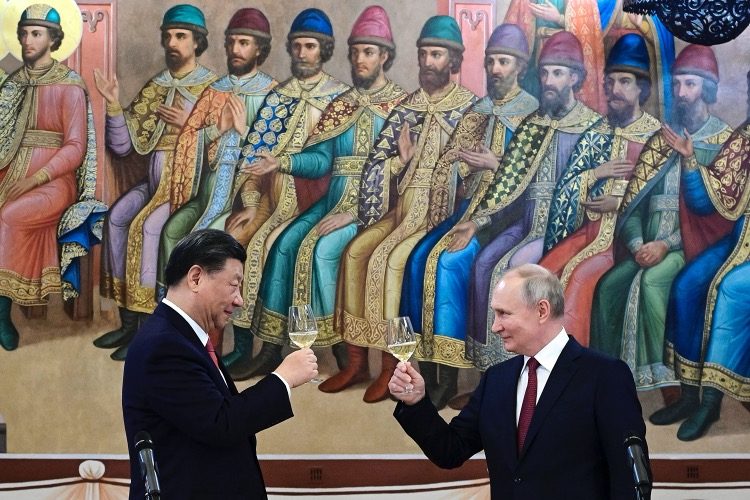
On Thursday Russian President Vladimir Putin spoke on the phone with his counterpart, Chinese authoritarian leader Xi Jinping, before the Lunar New Year.
Both leaders used the opportunity to evaluate the advantages of comprehensive bilateral cooperation, the Kremlin said in a readout of the conversation.
Putin and Xi maintained their commitment to working together at various forums, including the UN, BRICS, and the Shanghai Cooperation Organization, and exchanged opinions on pressing international matters, especially the Middle East conflict, the statement added.
China seeks “to uphold the spirit of mutual assistance and friendship from generation to generation, and work together to write a new chapter in China-Russia relations,” Xi told Putin, as cited by national media.
Putin reinforced that Russia backs China’s efforts to reconcile with the self-governing island of Taiwan. Moscow strictly abides by the One China policy, which backs Beijing’s claim of sovereignty over the island, the Russian leader added.
This year, Russia and China are commemorating the 75th anniversary of the establishment of bilateral diplomatic relations.
Xi praised Russia’s current presidency of BRICS, a group of non-Western economic powers that recently welcomed five new members. Also, the Chinese leader pledged Beijing’s support for Moscow’s program as it leads the group.
That same day, after the Xi-Putin call, Yury Ushakov, a senior foreign policy aide to Putin, said that Russia and China have brought the share of mutual trade settlements in their national currencies to 90 percent.
Furthermore, the official elaborated that both leaders during their call underscored the importance of creating a reliable joint financial infrastructure.
“It has been stated that over 90% of settlements between our countries are carried out in rubles and yuan,” Ushakov told journalists after the conversation between Putin and Xi.
“It was highlighted that it is important to continue working together to build a financial infrastructure that ensures reliable payments for the further steady development of trade and investment ties,” he added.
The heads of states also noted that Moscow and Beijing must continue to boost transport connectivity, modernize border infrastructure and checkpoints, and enhance cargo transportation.
In December, Russian Prime Minister Mikhail Mishustin said that Western currencies had been almost completely excluded in trade between Russia and China, as almost all payments between the neighboring states are now conducted in rubles and yuan.
Russia and its trade partners began to use national currencies in mutual trade after sanctions effectively cut Moscow off from the Western financial system. A rising number of nations are taking similar steps.
In January, citing an industry source, Russian importers of electronics have nearly completely abandoned the U.S. dollar and euro in settlements with foreign vendors and distributors.
A manager of one of the country’s electronics manufacturers told the outlet that almost all purchases in 2023 were paid for with Chinese yuan and Indian rupees, as well as with the national currencies of other developing countries.
One source, who asked not to be identified, told the Russian paper that substituting dollars with other currencies offers a number of benefits.
“Currently, in 99% of cases we use rubles, yuan, dirham, won, dong,” the industry representative said, adding that such deals pose “no risks of traceability of shipments, ensure fast circulation of currency, make it possible to reduce the number of intermediaries during deliveries and exclude participation of correspondent banks from unfriendly countries.”
Another source close to the industry said that in late 2023, various financial institutions in Russia even suggested brokering settlements in cryptocurrencies in deals with foreign suppliers.
The setting aside of dollars and euros by wholesale buyers of equipment is obvious, as per Eldar Murtazin, leading analyst at Mobile Research Group, who explained that Western currencies are now difficult to buy in ample quantities in Russia and very challenging to transfer to anyone abroad due to sanctions.
The analyst noted that the cost of purchases did not increase when Russian importers changed settlement currencies, adding that it even provides a modest one-percent savings when deals are settled in Chinese yuan.
Additionally, China’s currency can easily be exchanged, transferred, or converted into dollars outside of Russia, which allows market participants to avert shortages and failures in logistics or payment systems.
In a wide-ranging and highly anticipated interview that lasted more than two hours, Putin told American journalist Tucker Carlson that modern Ukraine is a country that was artificially created by the actions of the late Soviet leader Joseph Stalin after WWII.
The Russian leader stated that during the feudal fragmentation of Russia in the Middle Ages, Ukraine — which he portrayed as being part of Russian lands — came under heavy Polish cultural, religious, and political influence. In the 17th century, the people of this region wanted to join the then-growing power of Moscow, but Russia wanted to avoid war with Poland.
However, after a lot of deliberation, Moscow decided to bring this “part of old Russian lands” back into the fold, he said, which resulted in a war with Poland. Moscow reclaimed all of its “historic lands” during the reign of Catherine the Great, who ruled between 1762 and 1796, he recalled.
After the 1917 Communist Revolution in Russia and another war with Poland, Warsaw regained control over large swaths of Western Ukraine, Putin continued. In the 1920s, the Bolshevik government set up a Soviet Ukraine that “had never existed before.”
The Soviet authorities were “Ukrainizing” this region, in line with similar indigenization policies pursued in other areas, the president said.
“After the Second World War, Ukraine, in addition to the territories that had belonged to Poland, received part of the territories that had previously belonged to Hungary and Romania…. So, we have every reason to affirm that Ukraine is an artificial state that was shaped at Stalin’s will.”
Putin added that these nations in principle have the right to discuss the return of their former territories, but denied that he had ever discussed the matter with Hungary. However, he suggested that Hungarians living in Ukraine want to “get back to their historic land.”


